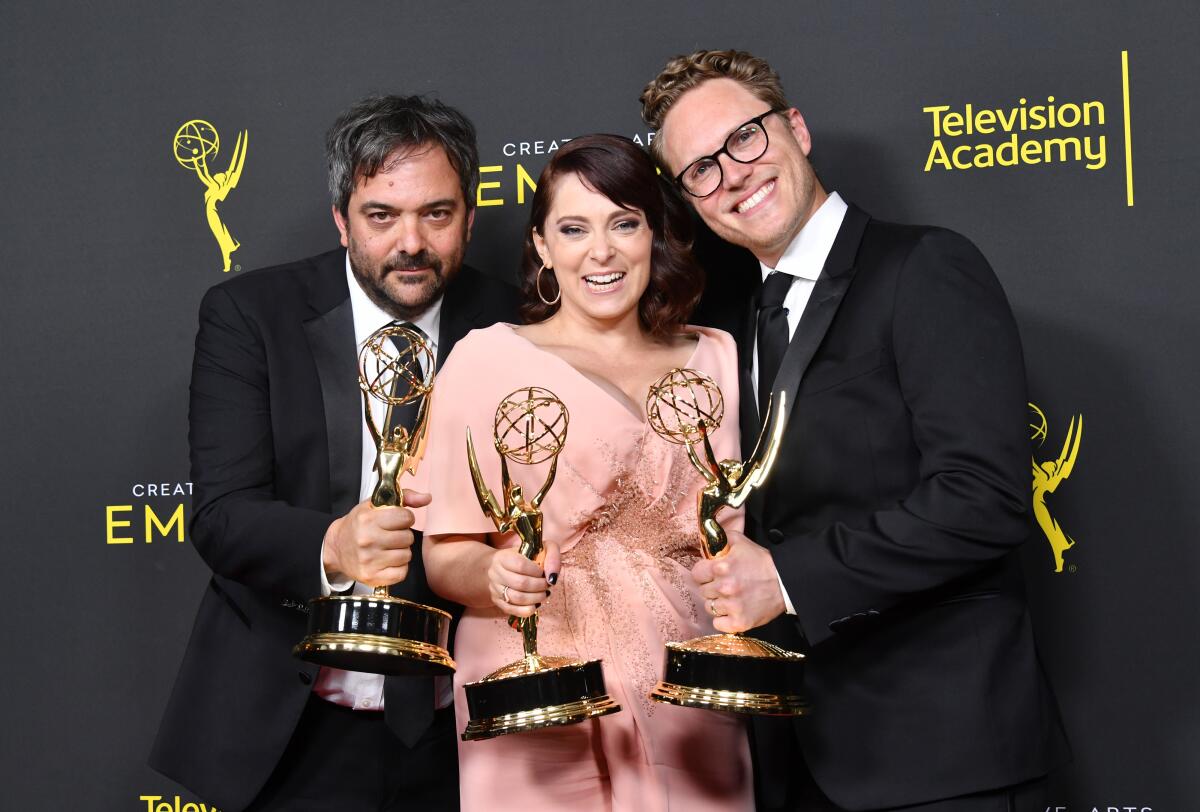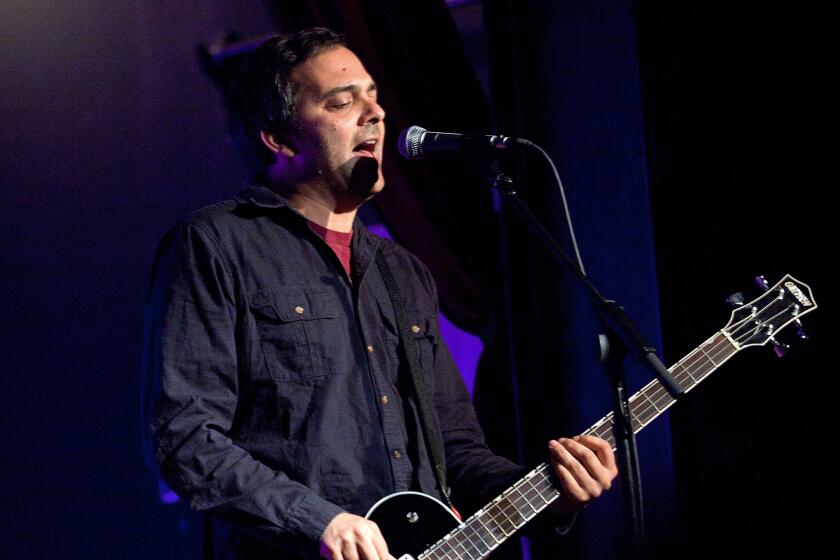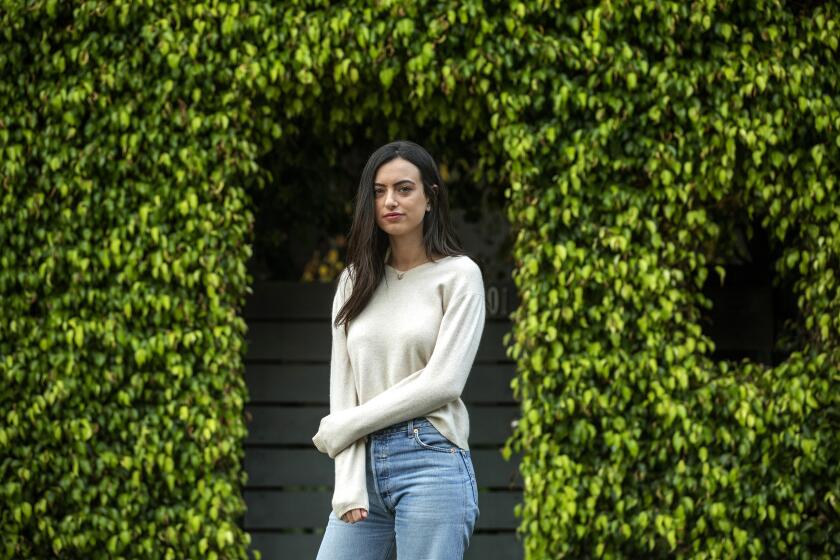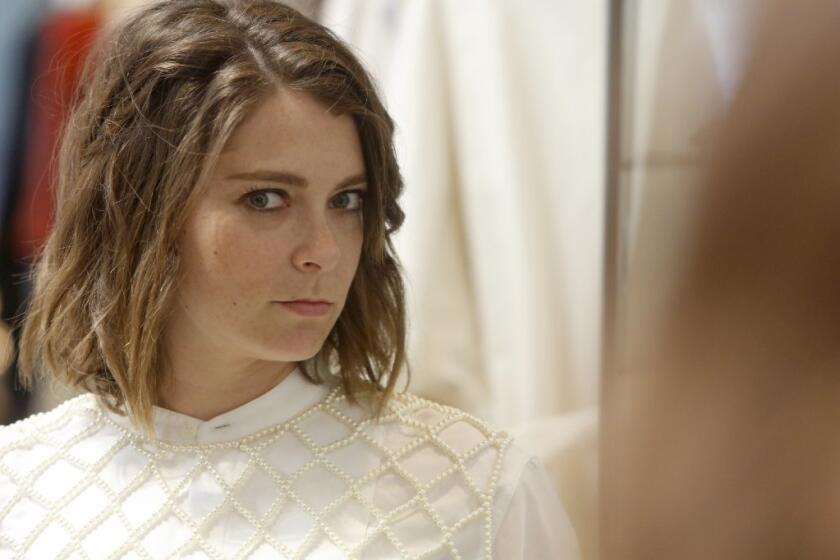Rachel Bloom wants to talk about bullies and crazy ex-boyfriends
On the Shelf
I Want to Be Where the Normal People Are
By Rachel Bloom
Grand Central: 288 pages, $28
If you buy books linked on our site, The Times may earn a commission from Bookshop.org, whose fees support independent bookstores.
Reading Rachel Bloom’s new book, “I Want to Be Where the Normal People Are,” is not unlike watching a sketch comedy show. One chapter is a storybook fairy tale about her biggest past relationships; another consists of apologies to former roommates in the form of an epic poem.
There’s an interview with her younger self (conducted by her even younger self) about her first TV writing experience, a casting breakdown of “Straight Men in Musical Theater” and reviews of Hollywood awards shows based on food, ambient temperature and the prevalence of shape-wear.
It’s all of a piece with “Crazy Ex-Girlfriend,” Bloom’s four-season CW musical comedy-drama, which featured frank and hilarious musical numbers on Jewish princesses, stalking and mental illness in a vast array of genres.
“I’d say it’s a pretty good representation of how my brain operates,” she told The Times of the book’s variety-show flavor. “It felt like I was putting daydreams on paper.” The essays, safely couched in their clever framing devices, allowed Bloom to be brutally honest about everything from OCD to the toxicity of the theater world without getting self-serious. (Sardonic exclamation points abound!)
Bloom wrote the book before the pandemic forced the shutdown of her industry; she edited it after the birth of her daughter and the death of Adam Schlesinger, her friend and musical collaborator, from complications of COVID-19. She spoke to The Times about Schlesinger, open secrets in the theater world and the book’s bonus track.
Adam Schlesinger, cofounder of “Stacy’s Mom” rock band Fountains of Wayne and songwriter for film and television, died from complications related to COVID-19. He was 52.
How did you choose which format each chapter would take?
It was very organic. A couple times, I was just writing something as a straightforward essay, and I’d suddenly go, “I’m bored!” Switching it up made it more fun for me to write, and hopefully more entertaining to read.
The framing devices could have been a way to emotionally shield myself. But I try to overcompensate by being as bare and raw and vulnerable as possible. I hope people see me, and all the parts of me that I’m sharing. [Topically,] there’s a lot of overlap with “Crazy Ex,” but that’s a character and not me.
One chapter is a script for a musical, with accompanying audio on your website. How did that come together?
I had to get out so much specific autobiographical stuff in a very quick amount of time. It’s very specific and I have no idea if anyone will relate to it, but there’s a delightful song to listen to, if nothing else. Like a cheesy, badly-done morality play for elementary schoolers, where everything is very on-the-nose and obvious. That was fun and freeing to write.
How did you record it during the pandemic?
The music was written by Jerome Kurtenbach, whom I’ve collaborated with many times. And it was produced by Jack Dolgen, also the executive producer of “Crazy Ex-Girlfriend” and co-creator of my first music video. He’s built a COVID-safe recording studio in his back house, and it felt like old times. It’s only me, singing every part. Which was cathartic, because sometimes I didn’t have to worry about how I sounded because I’d be playing a dude who can’t sing.
Why did you recount being bullied in your first TV writers room via an interview between your two younger selves?
I wanted to find a way to talk about that, as it was a very emotionally fraught time. That’s just how my mind works. I’d always imagine talking to my older self. And I had a lot of imaginary friends growing up which, strangely, didn’t come up in this book, I’m just now realizing.
You’ve talked about it before in interviews, but here you’re fully in control of the narrative.
I think a lot of people have had experiences like that, but they don’t have the freedom to talk about it. So I just hope it helps other people. I could have been way, way pettier. But it was important to me to not fall into the trap of just wanting to [crap] on people. Because I don’t want to get anyone from my old writing staff canceled. There were some email exchanges I was going to share, but I was like, “Eh, I can tell the story without that.” I’m proud of myself for my restraint!
In addition to some behind-the-scenes tidbits about making “Crazy Ex-Girlfriend,” you also pull back the curtain on awards-season absurdities.
As a kid, it was very exciting to watch the interviews and see all the outfits. But demystifying this insider-y Hollywood thing is important because the culture of the red carpet plays a huge part in how women and girls perceive themselves, and the gap between how we think they should look versus how we can actually look.
I’m thinking about my 13-year-old self who wrote down and organized all the tips in magazines about “how to get Jennifer Aniston‘s look.” It’s like, you won’t get that, because Jennifer Aniston didn’t do that. She was surrounded by professionals who styled her and did her hair and makeup for her.
Out with the essay collection ‘No One Asked For This,’ David talks candidly about nepotism, Pete Davidson and a terrifying, hilarious web of neuroses.
Speaking of critiques, you mention the “huge cover-up of a New York Times article that was going to be Broadway’s own #MeToo reckoning,” which is quite the open secret in the theater world.
[Laughs] Interestingly, that didn’t come up in my interview [about this book] with the New York Times.
I’m still really shocked about it. I talked to some Broadway friends about this, and one said that, had that article come out, it would’ve shut down half the shows on Broadway because it was about these big Broadway producers. I guess I won’t name anyone because it’s hearsay and I don’t want to get sued for libel. But it’s stunning that they could take down Harvey Weinstein, but they can’t take down Broadway?
That says a lot about how insular it is. Even though it seems to be on the forefront of certain things, like giving non-white actors real opportunities. And then there are other things where it’s just stuck in the ’70s, with this culture of worshipping old-school, misogynistic, patriarchal toxicity.
There’s a certain Broadway costume designer who has numerous accusations against him and he, as far as I can see, continues to work. And I, for the life of me, just can’t reconcile the two.
As someone working on multiple stage projects — a musical adaptation of “The Nanny” and an eventual “Crazy Ex-Girlfriend” production among them — do you have any qualms about working in that world again?
Yes. Because I know it can be better, and that’s exciting to me. I acknowledge the problems, but I have the status now to be able to get stuff made that can try to counter some of these problems.
It’s beautiful that the book is dedicated to Adam Schlesinger.
A year ago, I was in the thick of writing this book, and if I was told, “Hey, a year from now, you’re going to dedicate this book to Adam,” I’d be like, “Why would I do that?” Again, in the fantasy of speaking with past me and future me.
When the world comes back, I want to organize some sort of tribute concert to him. We lost a f— genius.

You were set to write the “Nanny” musical together. What’s the status of that project?
Because I was going on maternity leave, I finished the lyrics for the bulk of the songs for Act I, and he was going to turn them into demos. The day before he started feeling symptoms, he sent me the demo of the opening number.
He, Jack and I had such a shorthand. We’re in the process of finding a writing partner replacement. But musicals are slow anyway, it’s not like we had any readings coming up. It’s not like his show “The Bedwetter” with Sarah Silverman, which was actively about to go. I haven’t heard any of the songs from that, but I’m so excited to someday see a new Adam show. And whenever “The Nanny” comes out, I’ll share this demo, because it’s amazing.
Before the hungry Saturday brunch crowd started rolling into Silver Lake, Rachel Bloom, star and co-creator of the CW show “Crazy Ex-Girlfriend,” visited a few stores and boutiques near Sunset Junction on an August morning.
Lastly, you write about your love of the Los Angeles area’s amusement parks. Are you looking forward to returning, when it’s safe, with your daughter?
Oh, my God, I’m so excited. The only thing I have to be mindful of is not to be too excited, where it turns her off. Like, I have to temper my excitement for the Matterhorn so it doesn’t scare her, you know?
More to Read
Sign up for our Book Club newsletter
Get the latest news, events and more from the Los Angeles Times Book Club, and help us get L.A. reading and talking.
You may occasionally receive promotional content from the Los Angeles Times.










